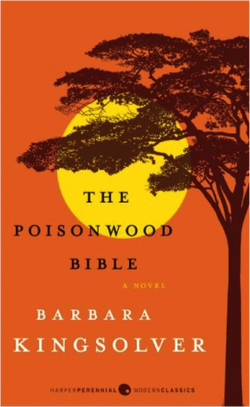
Author: Barbara Kingsolver
Genre: Fiction
# pages: 576
Date published: 1998
5-star rating: 4.5 stars
Would you recommend it: Yes
The Poisonwood Bible begins in 1959 when Nathan Price, a blindly devoted Baptist preacher, packs up his entire family to relocate from Georgia, USA to a small village in the Belgian Congo. Here, he plans to convert the local population, despite a less than enthusiastic response. The book focuses on the experiences of his wife and their four daughters, as they struggle to adjust to a society radically different from their own. They quickly learn that the few things they brought with them, from planting-seeds to cake mix, can’t survive in this new world and that conveniences and standards that seemed set in stone in their old home don’t exist here forcing each family member to deal with the changes in their own way. Meanwhile, Nathan Price develops not as the hero, but as a self-righteous antagonist. As time passes, political violence in the Belgian Congo erupts, threatening the safety of the Price family.
I found the novel painful to finish. Not because it was poorly written or suffered from a lack of character development or an inconsistent plot (in truth, it’s quite the opposite), but because I found it excruciatingly heart-wrenching. On one hand you have Nathan Price, an ignorant character relentlessly trying to make his mark on the world and then on the other, you have the rest of the family, struggling to deal with a situation for which they are not at all prepared. The author manages, through her excellent writing and characterization, to make it almost impossible to not emphasize with or at least feel sadness for the mother and daughters.
In spite of the many ugly moments in the novel, what that really made their struggle hit home for me were small, seemingly superficial things, like the mother not being able to bake a cake for one of her daughter’s birthdays because the American-made mix had been ruined by the climate. The author also frequently weaves in Western references, such as Betty Crocker or Coca Cola, which clash dramatically with the setting of the small, African town and left me feeling the same nostalgia that the characters experience. As the novel progresses and the political turmoil in the Belgian Congo begins to threaten the Prices, the author establishes a anxious, tense mood which had me almost skipping forward pages, just to find out what happened more quickly.
But even I found The Poisonwood Bible heartbreaking, that should not deter readers, and instead serves to demonstrate how well-written the characters are. The narration switches throughout between the points of view of the mother and daughters, and although sometimes in novels with multiple narrative views, I find myself frustrated at how similar each “person” sounds, The Poisonwood Bible offers a host of characters each strong enough that the whole book could have rested on them alone. The setting is also extremely well developed, with vivid development between the initial descriptions and the later political turmoil.
I would recommend this book to anyone, while bearing in mind the often-heavy subject matter. While it wasn’t an enjoyable read in the traditional sense of the word (at times I found myself wanting to go back to my badly-worn copy of Harry Potter), the character development and unforgettable plot make it worth the ensuing heartache.
Review by Julia Walker

 RSS Feed
RSS Feed
